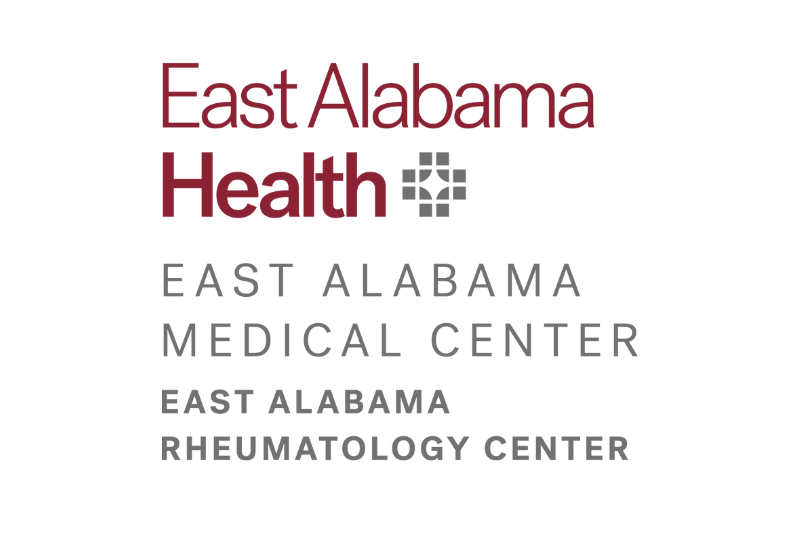Conditions We Treat
CALL FOR INFORMATION: 334-528-6610Rheumatologists at East Alabama Health offer high-quality, specialty services aimed at increasing patients' quality of life. The division cares for patients with all forms of rheumatic disease, including the following conditions. EARC also offers care for people with musculoskeletal disorders such as osteoarthritis and tendonitis.
To meet the complex needs of people with rheumatic diseases, EARC offers special programs for patients with the following conditions:
Rheumatoid Arthritis
Rheumatoid arthritis is an auto-immune disease in which the body attacks its own tissue and causes swelling, inflammation and pain in and around the joints. It is a progressive disease, and while it can be found in any joint, it typically begins in the hands or feet.
Ankylosing Spondylitis
Ankylosing Spondylitis is an inflammatory disease that can cause the smaller vertebrae in the spine to fuse over time, resulting in pain and stiffness in the spine. This fusing usually results in a hunched posture.
Calcium Pyrophosphate Deposition Disease
Calcium Pyrophosphate Deposition Disease (CPPD) may be hard to diagnose because the joint pain and other symptoms can mimic gout and other types of arthritis. Proper diagnosis depends on detecting calcium pyrophosphate crystals in the fluid of an affected joint. Anti-inflammatory medications reduce pain and swelling and can prevent or help relieve symptoms of CPPD, but there is no way to get rid of the crystals.
Gout
Gout is caused by a buildup of uric acid, which usually affects your feet. People who have gout typically experience attacks of pain, redness, and swelling in the joints of the feet, particularly in the big toe.
Giant Cell Arteritis
Giant cell arteritis (GCA) is a disease of blood vessels, may occur together with polymyalgia rheumatica (pain and stiffness in the neck, shoulder, and hip). GCA occurs only in older adults, those over age of 50, and can cause swelling and thickening of the arteries located on each side of the head called the temporal artery. If GCA affects blood flow to the eye, loss of vision can occur. Prompt detection and treatment of GCA can prevent loss of vision.
Granulomatosis with Polyangiitis
Granulomatosis with polyangiitis (Wegener's), also known as GPA, is a rare blood vessel disease. It can cause symptoms in the sinuses, lungs, and kidneys as well as other organs. It is a potentially serious disease. However, with prompt diagnosis, granulomatosis with polyangiitis can be treated effectively.
Psoriatic Arthritis
Psoriatic arthritis affects some people who have psoriasis, a chronic skin condition that causes red areas to develop on the skin. In most cases, the psoriatic arthritis diagnosis comes after a person develops psoriasis.
Lupus
Lupus is an autoimmune disease that occurs when a person’s immune system attacks its own tissues and organs, causing inflammation. Lupus can affect many parts of the body, including the joints, brain, blood cells, skin, kidneys, lungs and heart.
Myositis
Myositis covers several inflammatory conditions that can affect muscle, skin and blood vessels. The cause is unknown. Myositis almost always causes loss of muscle strength, and some patients also may have a rash. Early diagnosis and sticking to the treatment plan are important to prevent permanent muscle weakness.
Osteoporosis
Osteoporosis is a disease that causes the bones to become brittle and weak, which can lead to fractures and broken bones even with only mild stress put on the body. Fractures caused by Osteoporosis most commonly occur in the wrist, hips, and spine. Osteoporosis is mainly find in adults over the age of 60, and is most common in women.
Polymyalgia Rheumatica
Polymyalgia rheumatica (sometimes referred to as PMR) is a common cause of widespread aching and stiffness that affects adults over the age of 50, especially Caucasians. Because polymyalgia rheumatica does not often cause swollen joints, it may be hard to recognize. It may occur with another health problem, giant cell arteritis.
Scleroderma
Scleroderma is a disease that makes your body create too much collagen, which causes the hardening and tightening of connective tissues and skin. Scleroderma more commonly affects women and typically occurs between the ages of 30 and 50.
Sjogren’s Syndrome
Sjögren's is a systemic autoimmune, rheumatic disease that affects the entire body. The most common problems are dry mouth, dry eyes, fatigue and musculoskeletal pain. However, other potential complications include other areas of dryness, internal organ involvement, neurological complications, and lymphomas.
Takayasu Arteritis
Takayasu’s arteritis, also called TAK, is a rare form of vasculitis disease involving inflammation in the walls of the largest arteries in the body: the aorta and its main branches. The disease results from an attack by the body’s own immune system, causing inflammation in the walls of arteries. The inflammation leads to narrowing of the arteries, and this can reduce blood flow to many parts of the body.
Vasculitis
Vasculitis is a disease that is characterized by inflammation of the blood vessels. Vasculitis can sometimes occur as a result of using a particular medication or having a disease. Vasculitis can affect people at any age.
Tendinitis
Tendinitis is an inflammation or irritation of a tendon that causes pain and tenderness. Tendinitis most commonly occurs in the shoulders, elbows, wrists, knees and heels, but can occur in any of the tendons.




